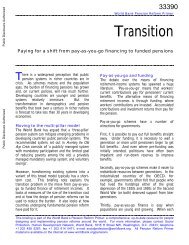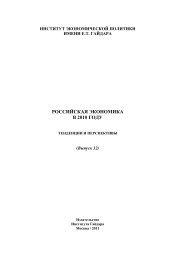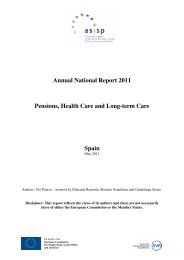Financial Sector Development in Africa: Opportunities ... - World Bank
Financial Sector Development in Africa: Opportunities ... - World Bank
Financial Sector Development in Africa: Opportunities ... - World Bank
Create successful ePaper yourself
Turn your PDF publications into a flip-book with our unique Google optimized e-Paper software.
The Potential of Pro-Market Activism for F<strong>in</strong>ance <strong>in</strong> <strong>Africa</strong>: A Political Economy Perspective 205<br />
Previous research on the politics of f<strong>in</strong>ance suggests that policy change is<br />
determ<strong>in</strong>ed by external f<strong>in</strong>ancial connections, po<strong>in</strong>t<strong>in</strong>g to the importance<br />
of the state’s revenue base. Large and relatively stable <strong>in</strong>flows of f<strong>in</strong>ancial<br />
resources from external sources (for <strong>in</strong>stance, through <strong>in</strong>ternational capital<br />
markets, exports of natural resources, or, arguably, foreign aid) make<br />
the government more <strong>in</strong>dependent from the domestic private sector and<br />
reduce the need to seek private sector support for particular policies<br />
(Haggard, Lee, and Maxfield 1993; Lukauskas and M<strong>in</strong>ushk<strong>in</strong> 2000;<br />
Moore and Schmitz 2008, 36–41). 18 Activist, bus<strong>in</strong>ess-friendly policies<br />
seem, therefore, more likely to succeed when governments rely substantially<br />
on the domestic private sector as a source of government <strong>in</strong>come<br />
and economic prosperity than when governments rely primarily on alternative<br />
sources of revenue (Brownbridge 1998b; Lewis and Ste<strong>in</strong> 1997;<br />
W<strong>in</strong>ters 1996).<br />
However, this is not to suggest that access to external f<strong>in</strong>ancial revenues<br />
has adverse effects <strong>in</strong> all circumstances. It seems plausible that, <strong>in</strong><br />
the context of a concentrated and autonomous private sector, access to<br />
revenues from external sources (such as foreign credit, <strong>in</strong>come from natural<br />
resources, or aid) reduces the vulnerability of governments to pressures<br />
from <strong>in</strong>cumbent private firms. Such a reduction of vulnerability<br />
might <strong>in</strong>crease the policy space for governments and dim<strong>in</strong>ish the likelihood<br />
of the political capture of activist policies (Maxfield 1994, 587;<br />
Moore and Schmitz 2008, 37; Rajan and Z<strong>in</strong>gales 2003).<br />
This discussion of the coalitional approach to expla<strong>in</strong><strong>in</strong>g or predict<strong>in</strong>g<br />
policy choices suggests that a framework to weigh the empirical<br />
support for us<strong>in</strong>g activism as a tool to <strong>in</strong>crease access to f<strong>in</strong>ance for<br />
productive private <strong>in</strong>vestment could usefully take <strong>in</strong>to account the role<br />
of the historically determ<strong>in</strong>ed organizational structure of relevant private<br />
sector <strong>in</strong>stitutions and the revenue base of the state. Both factors<br />
have important impacts on the structural dependence of governments<br />
on domestic capital, and on where authority resides with<strong>in</strong> the government<br />
(W<strong>in</strong>ters 1994). 19 As a result, both factors <strong>in</strong>fluence government<br />
discretion over policy mak<strong>in</strong>g and determ<strong>in</strong>e which particular public<br />
sector entities ga<strong>in</strong> the upper hand <strong>in</strong> the process of policy mak<strong>in</strong>g. Both<br />
factors also determ<strong>in</strong>e whether the domestic private sector (and which<br />
sections) constitutes a powerful ally <strong>in</strong> the design of activist policies.<br />
The added value of develop<strong>in</strong>g a coalitional approach to understand<strong>in</strong>g<br />
f<strong>in</strong>ancial policy choices is likely to be high, as few researchers have taken<br />
up this challenge (Boone 2005; Lukauskas and M<strong>in</strong>ushk<strong>in</strong> 2000;<br />
Maxfield 1990).







